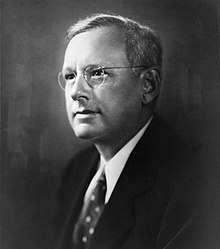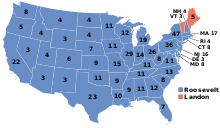Alf Landon
Alfred Mossman "Alf" Landon (born September 9, 1887 in West Middlesex , Mercer County , Pennsylvania , † October 12, 1987 in Topeka , Kansas ) was an American businessman and politician of the Republican Party . Between 1933 and 1937 he was the 26th governor of the state of Kansas. In 1936 he lost to incumbent Franklin D. Roosevelt in the presidential election .
Early years
Alf Landon grew up in Ohio before moving to Kansas with his parents at the age of 17. In Ohio he attended the Marietta Academy ; thereafter he graduated from the University of Kansas in 1908 with a law degree. Then he got involved in many areas of business. Among other things, he got into the oil business in 1912. During the First World War he served as an officer in the US Army .
Political advancement and governor of Kansas
Landon joined in 1912 the Progressive Party of Theodore Roosevelt on. From 1922 he was the private secretary of Governor Henry Justin Allen . A short time later he became the leader of the Liberal Republicans in Kansas. In 1932 he won the election to governor and held this office until 1937. Political America became aware of him in 1934 when he was confirmed as the only Republican governor in office, along with Frank Merriam of California . His government was marked by tax cuts and budget consolidation in the aftermath of the Great Depression . Landon also made an effort to protect the environment during his tenure. The administration was also reformed and unemployment benefits were introduced. In the lower administrative levels in Kansas, the same standards were introduced, especially in the budgetary sector. Despite his reputation as a conservative hardliner when it comes to finance, he never lost sight of social needs and grievances. As a result, leading Republicans saw him as a potential presidential candidate for 1936. That year, he therefore decided not to run for governor again.
Presidential candidacy in 1936
In the summer of 1936, Landon won his party's presidential candidacy; thus he became a challenger to the Democratic incumbent Franklin D. Roosevelt . Even in the run-up to the nomination convention , he was seen as the favorite for the Republican top candidacy. Landon owed his success above all to the mobilization of younger party comrades and the party's liberal wing. Vice-presidential candidate was Frank Knox .
Landon advocated a moderate electoral program that focused on increasing efficiency rather than undoing the New Deal reforms. In contrast to the conservative wing of the party, he did not want to abolish the social security introduced in 1935 . In public, Landon was seen as a serious opponent of the popular president during the autumn election campaign. Most of the polls predicted a close race. Some pollsters even predicted that the challenger would win. However, on election day, November 3, 1936, these prognoses turned out to be completely wrong: Roosevelt won like a landslide with 60.8% of the vote. Landon was supported by 36.5% of the electorate. Only in Maine and Vermont he won a majority and thus eight votes in the Electoral College . Roosevelt was successful in all of the remaining 46 states, received 523 electors and was re-elected for a second term.
Another résumé
After this painful defeat and his time as governor, Landon withdrew from active politics. Still, he often made his controversial point of view clear when asked. In the presidential election campaign of 1940 he campaigned for the Republican candidate Wendell Willkie , who, like Landon, represented a liberal program domestically. Willkie also pleaded for keeping the New Deal, but wanted to make it more efficient. So he fought vehemently against his party, which supported the neutrality laws , because he believed that the National Socialists in Germany saw the Americans as a weak and cowardly people. During the Second World War he also demanded that Great Britain should pay in full for the military goods which the USA made available to them through the lending and leasing law . However, he supported the Marshall Plan despite its financial size. In the 1960s, Landon polarized his party again by advocating the social reforms of the Great Society of Democratic President Lyndon B. Johnson . Landon also spoke out against racial discrimination throughout his political career and called for better living conditions for African Americans .
In 1966, Landon began teaching economics at the University of Kansas, the Landon Lectures , establishing a series of lectures on public issues that continue to the present day. He died 34 days after his 100th birthday. His daughter Nancy Landon Kassebaum was a member of the United States Senate for Kansas from 1978 to 1997 .
Web links
- Alf Landon in the National Governors Association (English)
- Biography at the Kansas Historical Society (English)
- Alf Landon in the database of Find a Grave (English)
- Literature by and about Alf Landon in the bibliographic database WorldCat (English)
- Newspaper article about Alf Landon in the press kit of the 20th century of the ZBW - Leibniz Information Center for Economics .
| personal data | |
|---|---|
| SURNAME | Landon, Alf |
| ALTERNATIVE NAMES | Landon, Alfred Mossman (full name) |
| BRIEF DESCRIPTION | American businessman and politician |
| DATE OF BIRTH | September 9, 1887 |
| PLACE OF BIRTH | West Middlesex , Pennsylvania |
| DATE OF DEATH | October 12, 1987 |
| Place of death | Topeka , Kansas |



